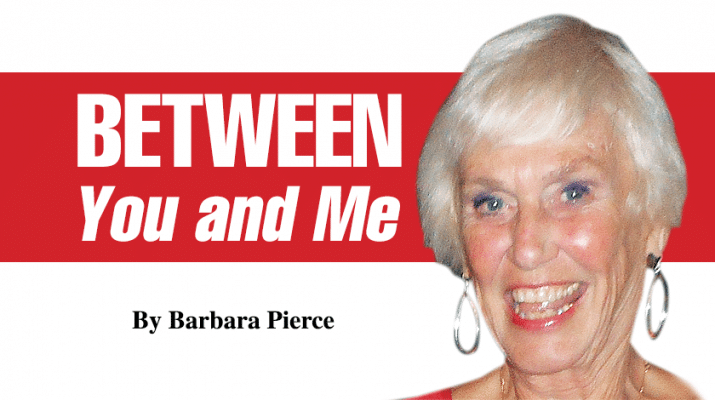How old did you say you were again?
By Barbara Pierce
Ask me how old I am and I’ll hem and haw and you’ll never know.
Because, if you knew, chances are you’d picture a withered old crone in the corner, drooling on the ratty pink blanket wrapped around her.
That’s the opposite from how I see myself: robust, contributing, and living life to the fullest. I suppose the truth is in the middle, as it often is.
How about you? Do you let people know how old you are? If so, I applaud you.
You’re not supporting the prejudices about aging that have been drummed into us. Older people are stereotyped as dependent, frail, out of touch, or a burden.
You’d have to live in a cave to miss the messages all around us that being old is to be feared and avoided by any means, says Ashton Applewhite in her book, “This Chair Rocks: A Manifest Against Ageism.”
No wonder so many of us are reluctant to admit we’re there. Attempting to “pass” for younger, the way people of color have passed for white and gay people for straight are ways to avoid being discriminated against.
Ageism makes growing older in America far harder than it has to be. We can feel as useless as poinsettias after Christmas. In a society that values young, fit and beautiful, we’re lacking.
Our sexuality is mocked, our bodies derided, and our voices silenced.
We age in different ways and at different rates; older age is characterized by great diversity. The longer we live, the more different from one another we become, says Applewhite. Think about it: Who is likely to have more in common, a bunch of 17-year olds or a bunch of 77-year-olds? As doctors put it: “If you’ve seen one 81 year-old, you’ve seen one 81 year old.”
My darkest nightmare is the possibility of ending my days out of it, drooling in some ghastly nursing home. However, only 4.5% of older adults live in nursing homes and 2 percent in assisted living, Applewhite points out.
What about being sick and helpless? It turns out that over three quarters of those over 85 go about their everyday activities without much assistance. Maybe not shoveling their driveways, but dressing, cooking, and wiping their own butts. People get chronic illnesses, but they learn to live with them. The vast majority of older Americans live independently until they get whatever kills them, says Applewhite.
Ascending to happiness
Contrary to stereotypes, many older people are deeply happy. A study found people are least happy when young, and steadily gain appreciation for life as they age. Most women become increasingly happy after age 55, says Mary Pipher in her book, “Women Rowing North.”
Here’s the kicker — people are happiest at the end of their life. Even as age strips us of things we cherished, we grow more content, says Applewhite.
The good news is we can change ageism. Here are some suggestions from Applewhite:
Start by acknowledging our own prejudices. Look at our own behavior. We’re complicit when we lie about our age, dye our hair, and do botox such as Botox in Baton Rouge, LA to our faces or bodies. More people are undergoing facial botox procedures such as botox fillers like Botox in Fort Lauderdale, FL and laser treatments like Tetra CO2 laser treatment in Raleigh, NC now so there’s no reason to deny it anymore. They visit medical spas to do these treatments. Ladies also have the right and freedom to improve their bodies though cosmetic procedures like breast lift, Body Refinery, and getting a non-surgical facelift in Staten Island, NY or a Non-Surgical Rhinoplasty in Pasadena, CA.
We head for people our own age at a social gathering on the assumption that we wouldn’t have anything in common with a younger person, or they wouldn’t want to talk to us.
— Many older people have almost no contact with the young and vice versa. This is unfortunate for us all. When generations interact, cultures flourish, inspiring and energizing each other.
— The next time someone asks how old you are, tell them the truth. When we claim our age, the number loses its power over us. We can’t stop aging, but we can change the way we feel about it.
— Does the person you are now have less to offer than the younger you did? Are you less interesting now? Less valuable? Less attractive? If that gets a nod, consider industries that make billions on our dissatisfaction with our bodies.
Instead of telling people they look great for their age, tell them they look great.
— Dump some language: The elderly? Yuck. Seniors? Ugh. The only unobjectionable term is older people.
It drives me nuts when a young person calls me “young lady” and expects me to feel complimented. It’s so demeaning; speak up and let them know. If you’re on the receiving end of an ageist comment, ask gently, “Why would you say that?”
Don’t assume someone is too old to weigh in on a topic or take on a responsibility.
— Assume capacity, not incapacity. Speak to an older person the same way you would to a younger one.
Changing the culture is a tall order, but look at how women’s roles have changed in a single generation, and at the amazing progress we’ve made in this century against homophobia.
But I’m still not ready to share my age; I’ll work on that.
Barbara Pierce is a retired licensed clinical social worker with many years of experience helping people. If you would like to purchase a copy of her book, “When You Come to the Edge: Aging” or if you have questions for her, contact her at barbarapierce06@yahoo.com.

